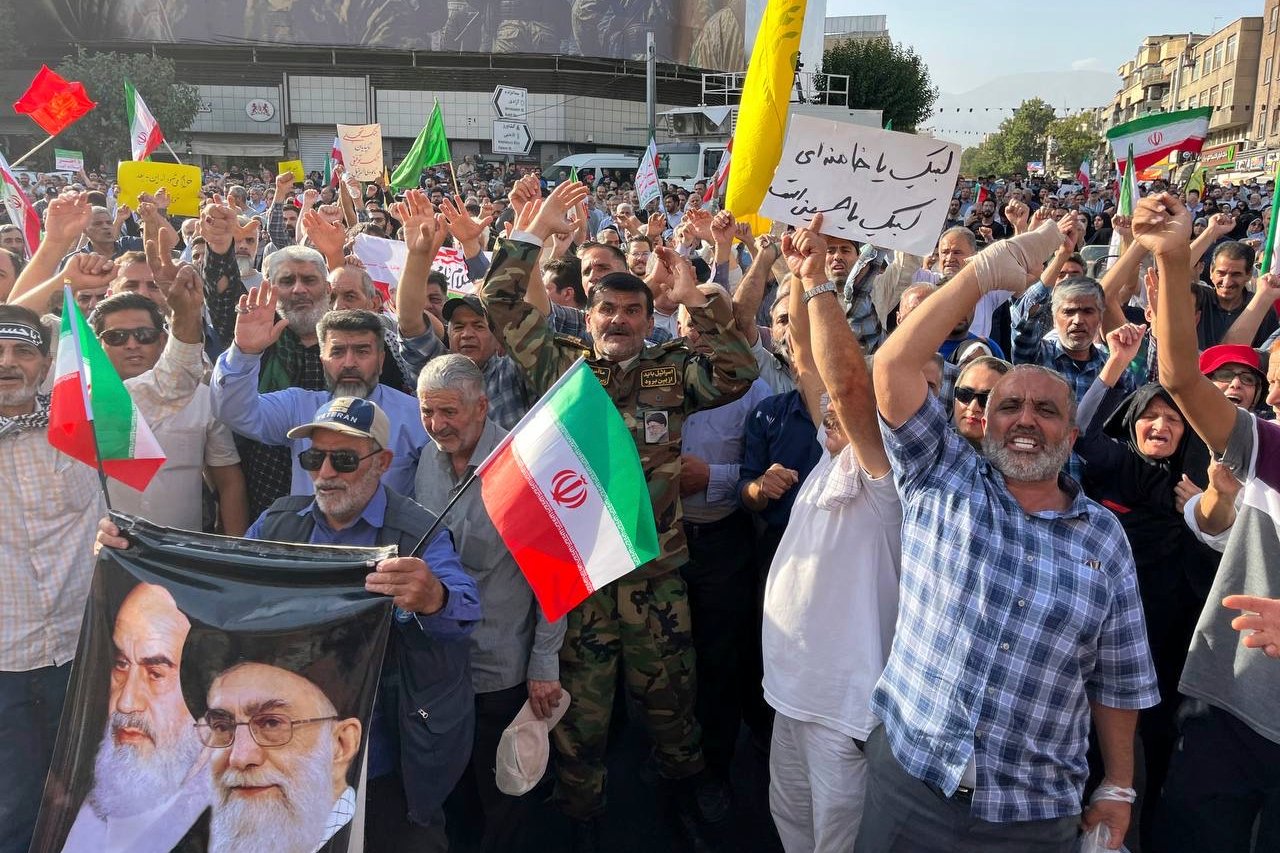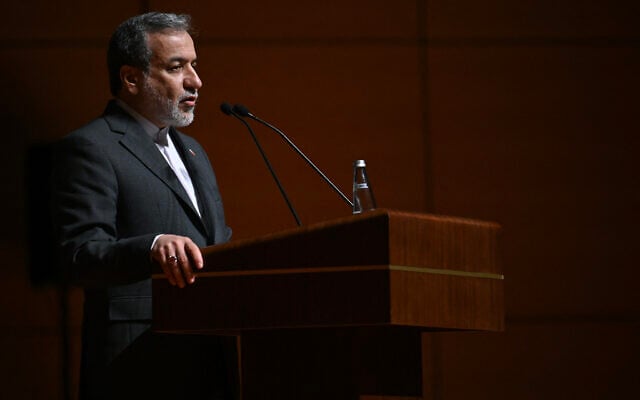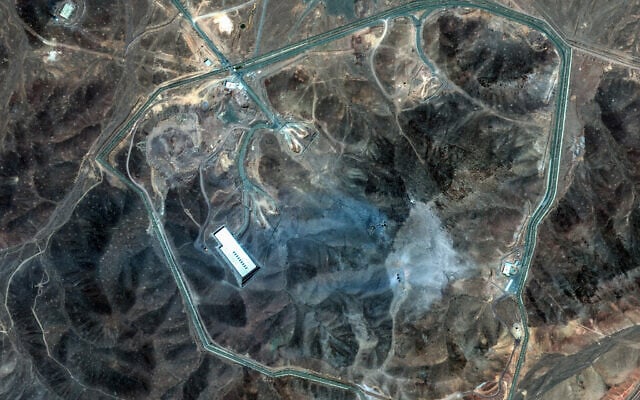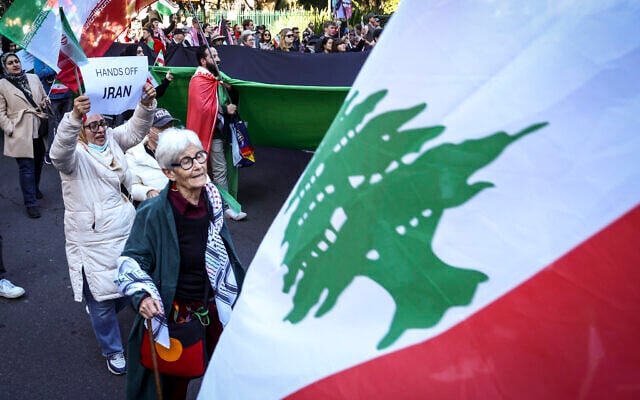



The world awaited Iran’s response on Sunday after the US struck Tehran’s key nuclear sites, joining Israel in the biggest Western military action against the Islamic Republic since its 1979 revolution.
With the damage visible from space after 30,000-pound US bunker-buster bombs crashed into the mountain above Iran’s Fordo nuclear site, Tehran vowed to defend itself at all costs.
But it had yet to follow through on its main threats of retaliation against the United States itself – either by targeting US bases or trying to choke off global oil supplies.
Speaking in Istanbul, Iranian Foreign Minister Abbas Araghchi said Tehran would consider all possible responses.
The US and Israel “crossed a very big red line by attacking [Iran’s] nuclear facilities,” Araghchi said, calling US strikes on the Fordo, Natanz and Isfahan facilities “a grave crime.”
He later said that Tehran could not return to diplomacy with the US, with which it had been in talks to forge a new nuclear deal, while it was under attack.
“The US showed they have no respect for international law. They only understand the language of threat and force,” Araghchi said, adding that Tehran has to respond based on its rights before diplomacy can be reconsidered.
Iranian President Masoud Pezeshkian also condemned US strikes on nuclear sites Sunday afternoon, declaring that the operation proved America to be “the main factor behind the Zionist regime’s hostile actions against the Islamic Republic of Iran.”
Araghchi told a meeting of the Organization of Islamic Cooperation that he would be traveling to Moscow later in the day to hold “serious consultations with the Russian president tomorrow.”
Moscow on Sunday led a chorus of condemnation from Iran’s allies and proxies, which accused Washington of deliberately destabilizing the already volatile region, and joined Tehran in downplaying the impact of the heavy bombardment.
Russia said the “irresponsible attack” had undermined the Treaty on the Non-Proliferation of Nuclear Weapons and was thus a “gross violation of international law.”
“It is already obvious that a dangerous escalation has begun, fraught with further undermining of regional and global security,” said the Russian foreign ministry. “The risk of the conflict spreading in the Middle East, which is already gripped by multiple crises, has increased significantly.”
It demanded a response to the strikes from the UN Security Council, which later said it would meet over the issue Sunday at Tehran’s request.
Russian President Vladimir Putin has repeatedly offered to mediate between the US and Iran.
Former Russian president Dmitry Medvedev, who remains a senior Kremlin official, asserted that the strikes ordered by US President Donald Trump would only strengthen the Islamic Republic by consolidating society around Supreme Leader Ali Khamenei, and would ultimately aid it in advancing its nuclear ambitions.
“Trump, who came in as a peacemaker president, has started a new war for the US,” said Medvedev, the deputy chairman of Russia’s Security Council, adding that “with this kind of success, Trump won’t win the Nobel Peace Prize.”
“Iran’s political regime has been preserved, and it is highly likely that it has become stronger,” Medvedev predicted. “The people are consolidating around the spiritual leadership, even those who did not sympathize with it.”
He claimed that Iran’s nuclear infrastructure did not appear to be affected by the US strikes, despite satellite photos appearing to show otherwise.
“The enrichment of nuclear material — and, now we can say it outright, the future production of nuclear weapons — will continue,” he wrote on X, and declared that several unspecified countries were “ready to directly supply Iran with their own nuclear warheads.”
Trump announced early Sunday that the US military had bombed Iran’s Fordo, Natanz and Isfahan nuclear sites, officially entering the fray to assist Israel in its campaign against the Islamic Republic’s nuclear program.
Trump’s decision to directly involve the US in the war came after more than a week of strikes by Israel that damaged Iran’s nuclear facilities, eradicated the country’s air defenses, and took out many of its military brass and top nuclear scientists. Iran, in retaliation, has launched dozens of ballistic missile barrages at Israel.
Turkey, which was hosting Araghchi on Sunday, warned in a statement put out by its foreign ministry that the strikes risked escalating the Iran-Israel conflict to a global level that could have “catastrophic” consequences.
“The ongoing developments could cause the regional conflict to escalate to a global level. We do not want this catastrophic scenario to come to life,” the Turkish foreign ministry said.
China, which itself has particularly strained ties with the US, joined in condemning the strikes, saying that they “escalate tensions in the Middle East.”
Beijing was calling on “all parties in the conflict, especially Israel, to cease fire as soon as possible,” its foreign ministry said.
Arab countries, including Western-aligned Gulf monarchies, also expressed concern over the attacks, warning of serious repercussions and calling for a return to diplomacy.
Many of the oil-rich Gulf countries host major US assets and bases and fear that a spillover from the war could threaten their security and economy. They have all been engaged in a diplomatic frenzy for solutions since June 13, when Israel launched its air campaign targeting Iran’s nuclear and military capabilities.
In a step toward what is widely seen as Iran’s most effective threat to hurt the West, its parliament reportedly approved a move to close the Strait of Hormuz, the entrance to the Gulf where nearly a quarter of the oil shipped around the world passes through narrow waters that Iran shares with Oman and the United Arab Emirates.
Iran’s Press TV said closing the strait would require approval from the Supreme National Security Council, a body led by an appointee of Supreme Leader Ayatollah Ali Khamenei.
Attempting to choke off Gulf oil by closing the strait could send global oil prices skyrocketing, derail the world economy and invite almost certain conflict with the US Navy’s massive Fifth Fleet, based in the Gulf and tasked with keeping it open.
US Secretary of State Marco Rubio, in a Fox News interview, called on China to encourage Iran to not shut down the strait.
“I encourage the Chinese government in Beijing to call them about that, because they heavily depend on the Straits of Hormuz for their oil,” said Rubio, who also serves as national security adviser.
“If they do that, it will be another terrible mistake. It’s economic suicide for them if they do it. And we retain options to deal with that, but other countries should be looking at that as well. It would hurt other countries’ economies a lot worse than ours.”
He warned Iran that retaliation would be “the worst mistake they’ve ever made.”
Rubio separately told CBS’s “Face the Nation” talk show that the United States has “other targets we can hit, but we achieved our objective.”
He later added: “There are no planned military operations right now against Iran unless — unless they mess around.”
Iran’s former arch-rival in the region, Saudi Arabia, which has been engaged in a Chinese-brokered detente with Tehran since 2023, expressed “great concern” over the attacks on its neighbor, the “sisterly Islamic Republic of Iran.”
“The Kingdom underscores the need to exert all possible efforts to exercise restraint, de-escalate tensions, and avoid further escalation,” the foreign ministry posted on X.
Qatar, host of the biggest US military base in the Middle East, said it feared “catastrophic consequences” for the region and the entire world, while Oman, which had been mediating the nuclear talks between Washington and Tehran, declared the strikes illegal and called for immediate de-escalation.
The United Arab Emirates, one of Israel’s staunchest regional allies, expressed concern after the attack, calling for “an immediate end to the escalation.”
Bahrain, home to a major US naval base, told most of its government employees to work from home until further notice following the escalation, and Kuwait said its finance ministry had activated an emergency plan that includes readying shelters.
And it wasn’t just the Gulf states that found themselves in a tight spot as they tried to condemn the strikes without upsetting their ties to the US.
Iraq, home to both a number of US bases and various Iran-backed militias that regularly threaten them, expressed “deep concern and strong condemnation” of the attacks, government spokesperson Basim Alawadi said, labeling them “a grave threat to peace and security in the Middle East.”
Egypt also condemned the escalation in Iran, warning of “dangerous repercussions” for the region and calling for diplomacy.
Although the Iran-backed militias in Iraq have threatened to target US bases over its decision to aid Israel’s military campaign, and the Houthi rebels in Yemen repeated their threats to target US vessels in the Red Sea, most of Iran’s network of proxy groups appear unlikely to enter the fray, and will be content with furious statements of condemnation.
In Lebanon, a spokesman for the Iran-backed terror group Hezbollah told Newsweek that the terror group will not attack the US or Israel.
“Iran is a strong country capable of defending itself, logic dictates that it can confront America and Israel,” said the official.
The group will remain committed to the ceasefire agreement “despite the attacks carried out by the Israeli enemy,” continued the spokesman.
Meanwhile, Lebanese President Joseph Aoun, largely seen as close to the United States, urged both sides to resume talks to restore stability in the region.
Lebanon has been reeling from a destructive conflict between Israel and Hezbollah, which ended with a fragile truce last November after Israeli strikes took out the organization’s leadership and IDF ground forces conquered Lebanese border towns.
It had already indicated at the outset of Israel’s air campaign against Iran that it was not going to get involved.
And in Gaza, a battered Hamas condemned what it called “blatant US aggression” against Iran. It said that the strikes were a “direct threat to international peace and security” and “a blind pursuit of the rogue Zionist occupation’s agenda.”
The Palestinian terror group is a shell of its former self, more than 20 months into its war with Israel, which it triggered with its deadly invasion into southern Israel on October 7, 2023.



